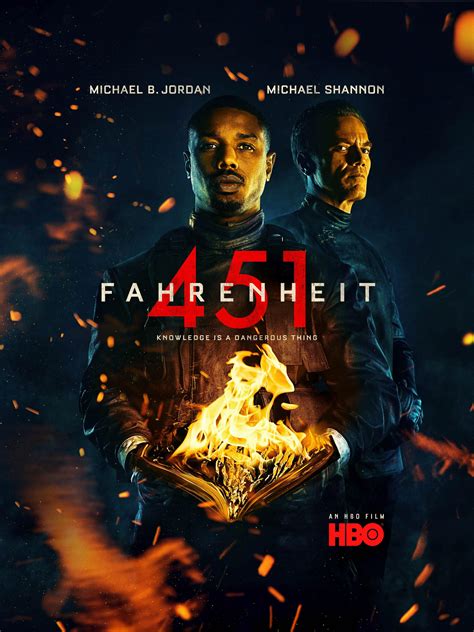Fahrenheit 451

Description:
Fahrenheit 451 (2018) depicts a near-future where books are banned and firemen burn any that are found. Guy Montag (Michael B. Jordan) begins to doubt his society after meeting the free-thinking Clarisse (Sofia Boutella) and witnessing a powerful act of intellectual resistance. Under Captain Beatty's (Michael Shannon) iron rule, Montag questions his role, seeks truth, and joins a covert circle that values knowledge over control. A brisk, visually striking meditation on censorship and conformity.Keywords:
Thoughtcrime, Science Fiction, Dystopian Thriller, Book Adaptation, CensorshipWhy is Fahrenheit 451 banned in schools?
"Fahrenheit 451" by Ray Bradbury is sometimes banned in schools due to its themes of censorship, the suppression of ideas, and the critique of government control over information. Some critics argue that the book's portrayal of a dystopian society, where books are burned to prevent dissent, is too controversial or inappropriate for young readers. Additionally, the use of strong language and depictions of violence can lead to further challenges and bans in educational settings, as parents and administrators may consider it unsuitable for students.
What is the story Fahrenheit 451 about?
"Fahrenheit 451," based on Ray Bradbury's novel, is set in a dystopian future where books are banned, and "firemen" burn any that are found. The story follows Guy Montag, a fireman who becomes disillusioned with his society's anti-intellectualism and begins to question the oppressive regime. As Montag discovers the power of literature and the importance of critical thought, he rebels against the system, leading to a journey of self-discovery and resistance. The film explores themes of censorship, conformity, and the value of knowledge.
Is Fahrenheit 451 like 1984?
Yes, "Fahrenheit 451" and "1984" share thematic similarities as both are dystopian novels that explore oppressive governments and the suppression of individual freedom. In "Fahrenheit 451," Ray Bradbury depicts a future where books are banned, and "firemen" burn them to maintain societal conformity and prevent dissent. Conversely, George Orwell's "1984" focuses on totalitarian surveillance, propaganda, and the manipulation of truth. While both caution against the dangers of censorship and authoritarianism, they do so through different narratives and societal critiques.
Is there a movie based on Fahrenheit 451?
Yes, there are two notable film adaptations of Ray Bradbury's "Fahrenheit 451." The first was released in 1966, directed by François Truffaut, and is known for its artistic style and exploration of the book's themes. The second adaptation, a television film, premiered on HBO in 2018, directed by Ramin Bahrani, and features Michael B. Jordan and Michael Shannon. Both adaptations interpret the novel's dystopian themes of censorship and the importance of literature, albeit with different stylistic approaches.
Explore More Categories:
Women S Baseball Doppelg Ngers Continuous Shot Language Live Performance Ohana Minimalism Lepidopterology American Culture Assassins Cybersecurity Explosions Music Connection Ai Dominance Grief Struggle French Film Family Drama School Shooting Exorcism Fame Imagination Hurricane Puppetry Supernatural Threat